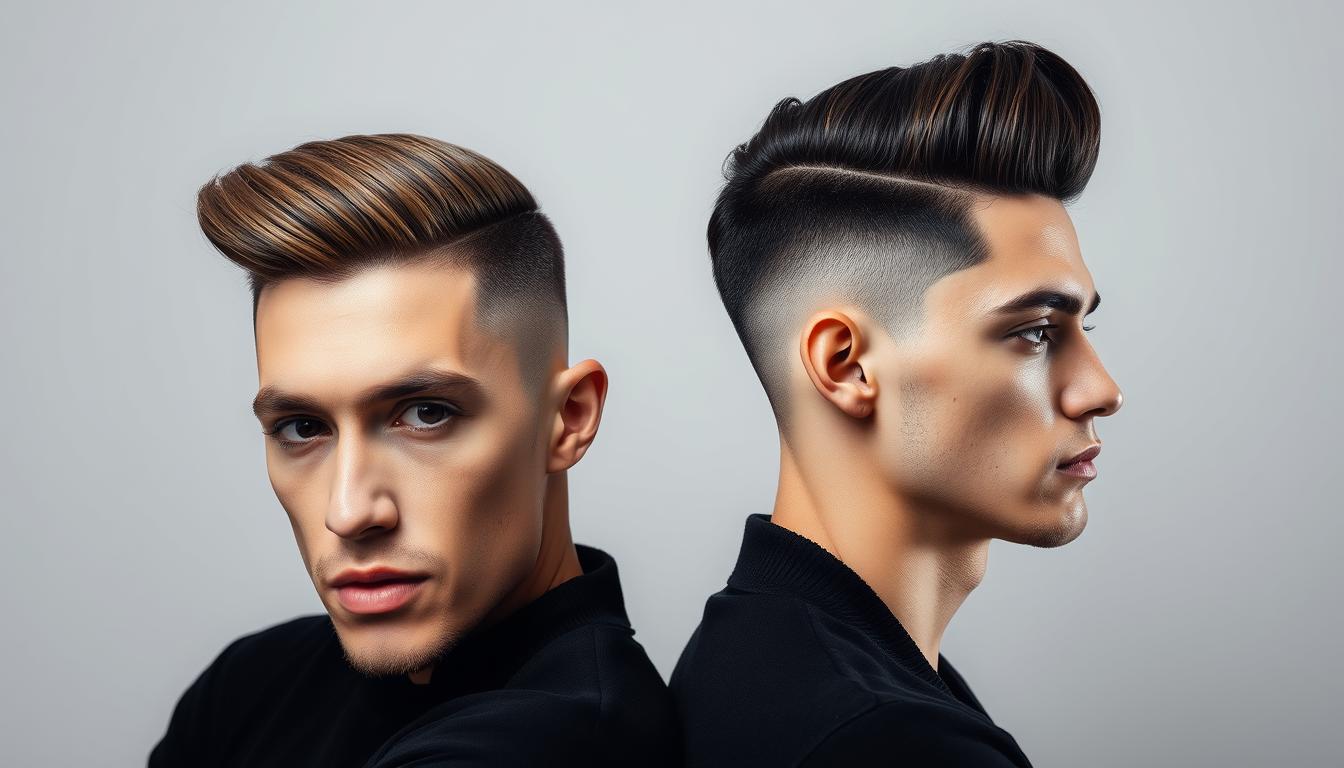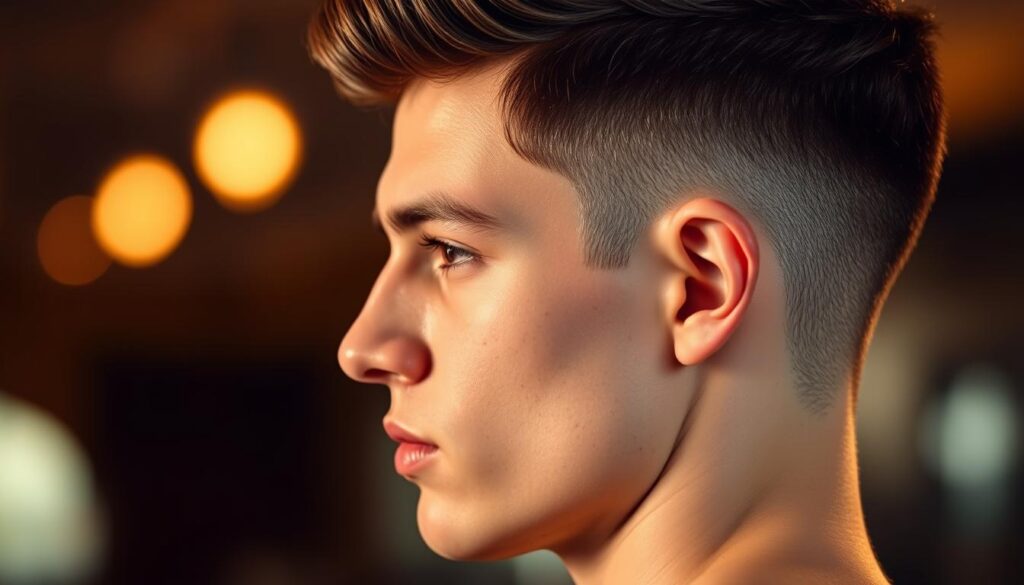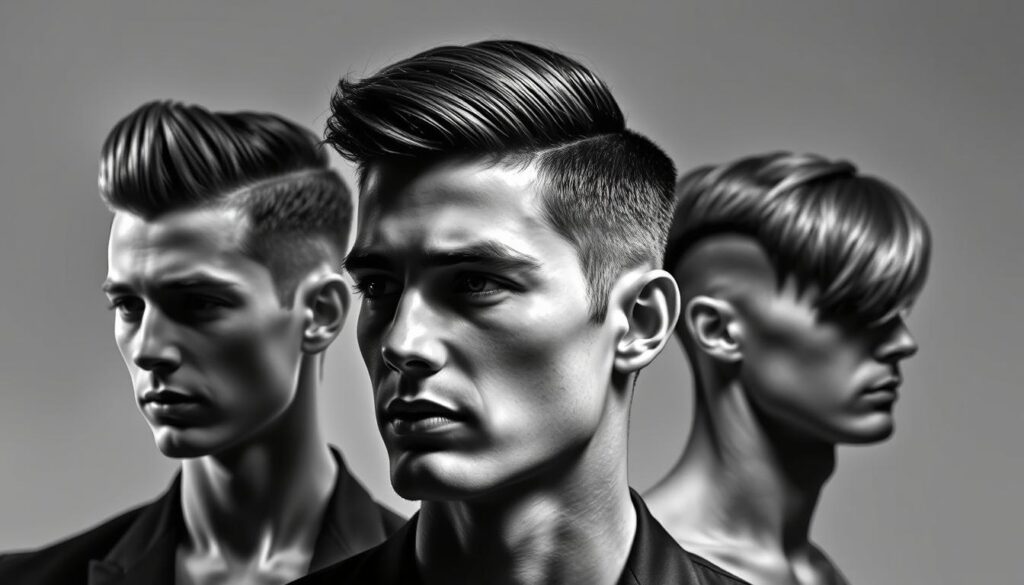
What if one hairstyle could redefine your entire look? The answer lies in a global sensation that’s reshaping modern grooming trends. Originating in South Korea, this cut became a cornerstone of K-pop culture, worn by icons like BTS and EXO. Its sharp contrast between short sides and a textured top creates a bold, versatile appearance that works for any occasion.
Once confined to Korean fashion runways, this style now dominates barber shops worldwide. Its rise isn’t just about aesthetics—it’s a cultural movement. The design adapts effortlessly to straight, wavy, or thick hair, making it ideal for diverse face shapes. Whether you prefer a polished finish or messy texture, it offers endless customization while keeping its signature edge.
Celebrity influence accelerated its spread, but its staying power comes from practicality. Unlike high-maintenance trends, this cut balances style with easy upkeep. It’s more than a haircut—it’s a statement of confidence for the modern man.
Key Takeaways
- Originated in South Korea and popularized by K-pop stars
- Features a striking contrast between short sides and longer top
- Adaptable to all hair types and face shapes
- Combines trendy appeal with low maintenance
- Represents a fusion of cultural and contemporary style
Introduction to the Two Block Haircut Men Trend

Imagine a design that turns heads without demanding hours at the mirror. This look splits your crown into two zones: cropped sides framing a statement-making top. Barber Andre Davis describes it best: “It’s architecture for your head—clean lines meet creative expression.”
What Defines This Signature Look?
The magic lies in bold separation. Clippers create a crisp boundary around the ears and neckline, while scissors shape the upper section into textured layers. Unlike gradual fades, this sharp divide makes the longer portion pop like a sculpted centerpiece.
Why It Captivates Today’s Grooming Scene
You get runway-ready edge that transitions seamlessly to boardrooms. The cropped sides reduce bulk, while the top adapts to your mood—sleek combovers for meetings or tousled waves for weekends. Pro tip: Use matte paste to maintain texture without shine.
Maintenance stays simple—trims every 4 weeks keep the contrast fresh. It works whether you sport straight locks or coiled curls. This chameleon-like versatility explains its explosive popularity across U.S. cities from Miami to Seattle.
The Origins and Global Influence of Two Block Haircut Men

In the heart of Seoul, a grooming revolution began. This sharp, layered style first emerged in South Korea’s buzzing fashion districts during the late 2000s. Barbers crafted it to mirror the energy of K-pop’s rising stars, blending rebellious flair with polished precision.
From South Korea to Global Runways
By 2012, idols like G-Dragon and Taeyang turned this cut into a cultural emblem. Their bold looks in music videos sparked a frenzy among fans. Soon, Seoul’s streets became a runway for this audacious style. Western designers took notice after spotting it at Seoul Fashion Week in 2015, adapting its contrast-heavy design for Paris and New York collections.
| Year | Milestone | Impact |
|---|---|---|
| 2010 | Early K-pop adopters | Local popularity surge |
| 2013 | BTS debut with the style | Asian market dominance |
| 2017 | Global fashion shows | Western adoption begins |
Cultural Impact and Celebrity Endorsements
This cut shattered Korea’s conservative grooming norms, symbolizing youth rebellion. When Park Bo-gum wore it in the 2016 drama Love in the Moonlight, searches for the style spiked 300% overnight. Jungkook’s textured version at the 2019 Billboard Awards cemented its status as a boundary-pushing fashion statement.
Today, it’s not just a trend—it’s a bridge between cultures. From Tokyo salons to Brooklyn barbershops, people embrace its versatility. As stylist Mia Kim notes: “It’s how Gen Z wears confidence—sharp, adaptable, and unapologetically modern.”
Key Features and Styling Elements of the Two Block Look
The secret to this style’s magnetic appeal lies in its bold geometry. Sharp angles meet soft textures, creating a head-turning silhouette that adapts to your personality. Let’s break down what makes this design stand out in crowded barber shops.
Contrast Between Sides and Top
Your sides become the canvas for precision. Choose between a high fade for dramatic elevation, a drop fade for curved elegance, or a classic taper for subtlety. Each option sharpens the visual separation from your longer top section. As barber Carlos Mendez advises: “The right fade acts like a frame—it directs attention to your crown’s masterpiece.”
Textured Finishes and Voluminous Tops
Volume meets control through strategic layering. Your stylist thins the upper layers to remove bulk while maintaining height. This creates natural movement—whether you slick it back or tousle it forward. Matte paste adds grit without stiffness, while sea salt spray enhances wavy textures.
Three styling rules keep your look fresh:
- Blow-dry damp hair upward for instant lift
- Use finger-combing instead of brushes for organic texture
- Trim sides every 3-4 weeks to preserve contrast
This design thrives on contradiction: clean yet edgy, structured yet adaptable. Your top becomes a chameleon—sleek for client meetings, artfully messy for weekend adventures. It’s not just a cut; it’s your daily style playground.
Exploring Two Block Haircut Men Variations
How do you transform a signature style into multiple standout looks? The answer lies in creative adaptations of the classic contrast design. These variations let you tailor the cut to your personality, hair type, and lifestyle while keeping its core identity intact.
Faded Sides Meet Statement Tops
Fades elevate the sharp contrast between sections. A high fade starts near the temples, creating dramatic elevation for angular faces. Medium fades balance rounder shapes, while low fades offer subtlety for professional settings. Each type changes the cut’s energy:
| Fade Type | Best For | Maintenance Level |
|---|---|---|
| High | Square/Jawline Emphasis | Every 3 Weeks |
| Medium | Round Faces | Every 4 Weeks |
| Low | Office-Friendly Styles | Every 5 Weeks |
Personalizing With Bangs, Curls & Facial Hair
Bangs add playful movement to the structured design. Swept-forward pieces soften foreheads, ideal for oval or heart-shaped faces. For curls, layers enhance natural volume while keeping sides tidy. Pairing the style with a beard? Keep facial hair trimmed to complement the fade’s sharpness.
Stylist Lena Park notes: “Curly textures add organic contrast—tight coils below meet flowing waves above.” Use light-hold gels for definition without crunch. For beards, apply balm to maintain clean lines that mirror the haircut’s precision.
Styling Tips and Best Practices
Mastering your look requires more than just a great cut. The right styling techniques elevate your style from ordinary to head-turning. Start with clean, towel-dried hair—damp strands hold shape better while absorbing products evenly.
Choosing the Right Part: Side vs. Middle
A middle part creates symmetry for oval or square faces, especially with straight or fine hair. It delivers a clean, modern vibe perfect for professional settings. Side parts add diagonal movement, balancing rounder face shapes. Stylist Marco Torres suggests: “Shift your part 1-2 inches from center for casual flair without losing structure.”
Utilizing Pomade, Wax, and Sea Salt Sprays
Sea salt spray builds foundational texture. Spray it on damp hair before blow-drying upward for natural volume. For polished finishes:
- Pomade: Creates sleek combovers—ideal for formal events
- Wax: Adds flexible hold for textured, messy styles
Rub a pea-sized amount between palms before applying. Focus on mid-lengths to ends to avoid greasy roots. Nightly rinsing keeps buildup at bay.
Switch between products based on your agenda. Matte wax handles weekend adventures, while high-shine pomade nails client meetings. Your style adapts as fast as your day demands.
How to Tell Your Barber About Your Two Block Haircut Vision
Walking into the barber’s chair prepared makes all the difference. Start by clearly describing the contrast between sections. Say: “I want the sides faded with a #2 guard and the top long enough to comb forward to my eyebrows.” This sets expectations while leaving room for their expertise.
Communicating Desired Fade and Length
Specify fade height using everyday terms. A high fade starts near your temples, while a low fade begins at the ears. For clipper lengths:
| Area | Guard Number | Length |
|---|---|---|
| Sides | #2 | 1/4 inch |
| Back | #3 | 3/8 inch |
| Top | Scissor-cut | 3-4 inches |
Mention if you prefer tapered edges or hard lines. Bring up maintenance needs—shorter fades require more frequent trims.
Sharing Reference Photos and Style Preferences
Photos eliminate guesswork. Choose images showing:
- Front, side, and back angles
- Natural lighting (no filters)
- Similar hair texture to yours
Barber Mia Chen advises: “Show 2-3 examples. Point out specific details you like—textured ends or how the fade blends.” Discuss styling habits too. If you rarely use products, request a lower-maintenance finish.
Tailoring the Look: Face Shapes and Hair Types
Finding the perfect style starts with understanding your unique features. This design adapts to enhance your natural structure while balancing proportions. Let’s explore how to customize it for your face shape and hair type.
Ideal Styles for Round and Oval Faces
Round faces thrive with vertical emphasis. Ask your barber for height at the crown and tight fades on the sides. This elongates your profile, creating sharper angles. Stylist Jamie Rivera notes: “A disconnected top section draws eyes upward, countering circular lines.”
Oval shapes have more flexibility. Experiment with side-swept bangs or textured crops. Your balanced proportions let you play with asymmetry without losing harmony. Keep the top 2-3 inches long for maximum versatility.
Adapting the Cut for Straight, Wavy, or Curly Hair
Straight textures shine with razor-sharp edges. Blunt cuts maintain clean lines, while subtle layers add movement. Use lightweight pomade to avoid flattening the crown.
Wavy hair adds organic contrast. Let natural texture peak through by scrunching damp strands with sea salt spray. For curls, shorter layers prevent bulk. Barber Trey Coleman advises: “Trim coiled tops every 6 weeks—they expand as they grow.”
Thick hair? Keep sides ultra-short to balance volume. Fine strands benefit from tapered fades that create illusion of density. Your features guide the blueprint—sharpen edges or soften lines accordingly.
Maintenance and Care for a Fresh Two Block Cut
Keeping your style sharp doesn’t require a salon visit—just smart habits. This sleek combination of faded sides and structured top thrives on simple routines. Start with quality tools: a boar-bristle brush distributes natural oils, while microfiber towels prevent frizz.
Daily Styling and Product Recommendations
Blow-dry damp hair upward using cool air to lock in volume. Warm a pea-sized amount of matte clay between palms before scrunching it into your crown. For all-day hold without stiffness, try sea salt spray on towel-dried strands.
Rotate products based on your schedule. Lightweight wax works for office days, while strong-hold paste handles weekend adventures. Avoid greasy formulas—they flatten textured layers.
Tips for Low-Maintenance Grooming
Schedule trims every 3-4 weeks to maintain the fade’s crisp contrast. Use dry shampoo between washes to absorb excess oil. At night, rinse out styling products thoroughly to prevent buildup.
Embrace your natural texture. Wavy hair? Let it air-dry before adding texture spray. Straight strands? A quick comb-through keeps lines sharp. This hairstyle stays fresh with minimal effort when you master these essentials.
